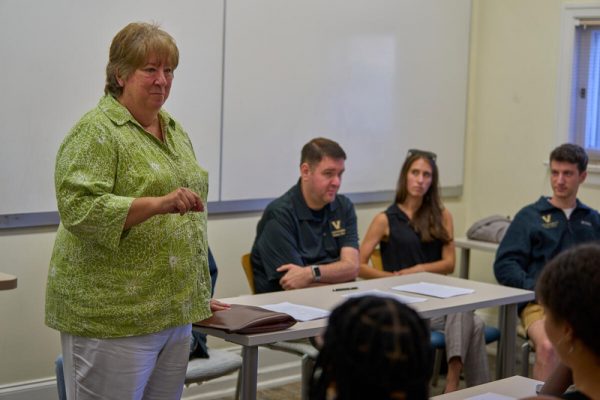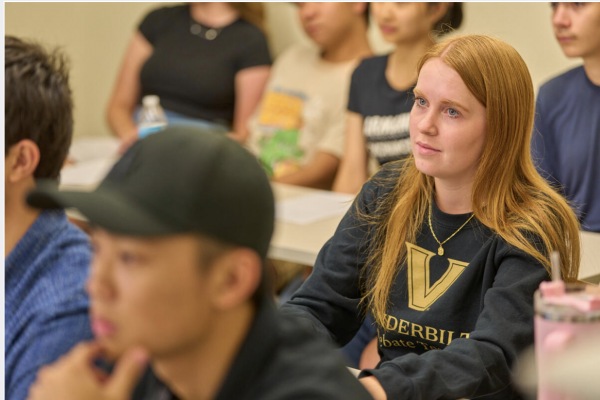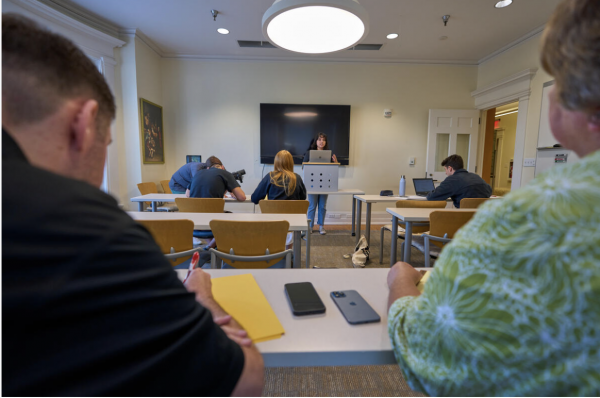Since the founding of Vanderbilt University, public speaking and debate have played an instrumental role in campus life. This fall, Chancellor Daniel Diermeier launched Dialogue Vanderbilt to reaffirm the university’s commitment to free expression and open forums. While the culture of free speech is under threat today at many universities across the country, and in society at large, Vanderbilt remains firmly dedicated to protecting and promoting civil discourse and free expression—values that have long informed our campus culture.
Always at the helm of fostering campus dialogue, the Vanderbilt Debate team exists to provide on-campus, national and international educational opportunities that enable students to improve their analytical, communication, critical thinking, listening and research skills. Debate provides a structured forum for students to examine major issues and concerns facing our society. Through debate, students investigate the world rigorously and learn to engage in civil and respectful dialogues—especially with those who hold different viewpoints.
A long-standing history of debate
In the late 1800s, intercollegiate debate competitions would take place when one institution invited another to debate a particular topic. Vanderbilt’s primary debate rival during that time was Sewanee: The University of the South. To pay homage to the historical rivalry between Vanderbilt and Sewanee, the universities faced off on Nov. 3 at the First Amendment Center for the Sesquicentennial Public Debate Celebration.
As an example of how valued open discourse has been since the university’s founding, Frank Armstrong, the wife of Cornelius Vanderbilt, wrote in a letter establishing the university’s Founder’s Medals that the Commodore “wishes one medal to be handsomer than any of the others and that to be for the finest Oratory and Elocution to be left open to competitions of any class.”
As such, the Founder’s Medal for Oratory was the original and most prestigious Founder’s Medal awarded by the university, predating the others by almost a year. Around the same time, two literary societies, the Dialectic Society and Philosophic Society, formed for the purpose of “exercise in debate, elocution, composition, and other wholesome mental and social work.”
An official debate team that competes against and travels to other universities has been part of Vanderbilt since at least the 1930s, when such competitions became more common nationally.
The past informs the present
The success of the current-day Vanderbilt Debate team is built on the strong foundation of debate at Vanderbilt throughout the past 150 years.

“The opportunities available to debaters on the team today are the result of the hard work and the successes of the debaters who preceded them on the Vanderbilt team,” said M.L. Sandoz, director of forensics at Vanderbilt University. “We want all the debaters to respect what has been built for them, and we try to instill in everyone a sense of responsibility to their own development, to the good of the team this year and to the good of the team in the years to come.”
Sandoz says the culture of the team is built on mutual respect. Regardless of political opinion, the team expects everyone to listen to each other and honestly consider other perspectives. This is because a debate team cannot learn, grow and be successful without considering multiple perspectives, and one cannot truly find their own opinion without listening to and considering all available data. The new Dialogue Vanderbilt program builds on this culture, which has existed at Vanderbilt since its founding, and Sandoz says the team is happy to be part of this culture.
A great start to a year with debate front and center
Vanderbilt Debate has long had a reputation on the local and national level, and in recent years the team has gained an international reputation. The team has attended tournaments in Colombia, Finland, France, Japan, Rwanda, Spain and Thailand, doing important work to fulfill the university’s mission to bring the world to Vanderbilt and Vanderbilt to the world.

The current team has had a successful start to the year. Vanderbilt Debate had a team in the finals of the varsity division at both the Carroll College and the University of Denver BP tournaments. It also had four out of the top 10 speakers at the University of Denver tournament. The team has already held trainings for more than 40 new interested students, worked on a civil discourse workshop with the first-year residential colleges and will virtually host the Rwandan National Debate Team later in November. Finally, the debate team will also launch the Advocacy, Debate, and Dialogue Lab for Civil Discourse, which will serve as a central hub for workshops and university-wide events.
“Having the entire university focus on civil discourse is very exciting. Our work crosses paths with and is essential to every discipline,” said John Koch, director of debate at Vanderbilt University. “While we have been coaching students from every school, college and major at the university, our work has primarily been in the background of university activities. We look forward to working with more students and colleagues as the Dialogue Vanderbilt initiative further develops.”
